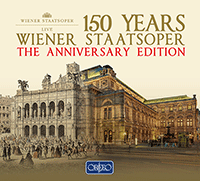Leonie Rysanek
Leonie Rysanek, whose father was of Czech descent, studied with her younger sister Lotte (her own first name was a contraction of ‘Leopoldine’) at the Vienna Academy of Music, where her teachers included Alfred Jerger and Rudolf Grossmann. She made her operatic stage debut in 1949 at Innsbruck as Agathe / Der Freischütz and between 1950 and 1952 was a member of the Saarbrücken Opera.
Here Rysanek was spotted by Wieland Wagner, who invited her to sing Sieglinde / Die Walküre at the reopening of the Bayreuth Festival in 1951. Having now attracted international attention, she returned to Bayreuth to sing Sieglinde (1958, 1965–1969), Elsa / Lohengrin (1958), Senta / Der fliegende Holländer (1959, 1969–1970), Elisabeth / Tannhäuser (1964–1966) and Kundry / Parsifal (1982–1983).
In 1952 Rysanek joined the Bavarian State Opera, Munich, remaining with it until 1954. Here she sang many of the major Richard Strauss soprano roles, for which she was an ideal interpreter with her strong upper register and powerful dramatic presence. As well as the title role in Die aegyptische Helena, she sang the Empress / Die Frau ohne Schatten and Chrysothemis / Elektra; and in the Italian repertoire Lady Macbeth / Macbeth, Santuzza / Cavalleria rusticana and the title parts in Turandot, Tosca and Medea. She made a big impact when singing Danae / Die Liebe der Danae with the Munich company when it visited the Royal Opera House, London in 1953.
Later roles at Covent Garden included Chrysothemis (1954), Sieglinde (1955), Tosca (1959), Elsa and the Marschallin / Der Rosenkavalier (both 1963). Rysanek made two debuts in 1954: at the Vienna State Opera as Senta (remaining active with this company for over forty years) and at La Scala, Milan as Chrysothemis. She first sang at the Salzburg Festival in 1958 as a soloist in Verdi’s Requiem, followed by the Empress (1974–1975).
In North America Rysanek’s first appearance was with the San Francisco Opera in 1956 as Senta. This was followed over the next four years by Sieglinde, Turandot, Amelia / Un ballo in maschera, Leonora / La forza del destino, the title role in Aida, Elisabeth and Lady Macbeth. She made her first, unscheduled, appearance at the Metropolitan Opera, New York in 1959, substituting for Maria Callas as Lady Macbeth and instantly winning over the critical New York audience. Henceforth Rysanek performed mainly in New York and Vienna with occasional guest appearances elsewhere. At the Met she sang a considerable range of roles, including Aida, Elisabeth de Valois / Don Carlo, the Forza Leonora, Tosca, Leonora / Fidelio, Senta, Elsa, Elisabeth, Sieglinde, the Marschallin, the Empress, Chrysothemis, Ariadne / Ariadne auf Naxos (1970), the title role in Salome (1972) and Abigaille in the first Met production of Nabucco (1960). This last induced a short vocal crisis and she did not return to the role.
During the 1980s and 1990s Rysanek gradually moved into mezzo territory, her roles including Kundry (1985), Ortrud / Lohengrin (1985), Kabanicha / Kát’a Kabanová (1991), the Kostelnička / Jenůfa (1992), Klytaemnestra / Elektra (1992) and the Countess / The Queen of Spades (1995) in which she made her last appearance in New York (1996), having been diagnosed as suffering from bone cancer. Her final operatic appearance also took place that year, when she sang Klytaemnestra at the Salzburg Festival.
Rysanek managed her career carefully, singing only about forty-five performances a year and avoiding exhausting roles such as Brünnhilde and Isolde. She possessed a powerful, well-projected and expressive voice which could cut through a large orchestra with ease. Combined with her whole-hearted dramatic commitment on stage, the effect was frequently overwhelming. Few have equalled the overall power of her interpretations of key roles in the Strauss operas such as Chrysothemis, Danae, Helena, the Empress, the Marschallin and Salome. To quote the conductor James Levine: ‘She had a fire burning in her at all times. It’s remarkable for someone to combine such intensity with a voice of such resilience and range.’
© Naxos Rights International Ltd. — David Patmore (A–Z of Singers, Naxos 8.558097-100).




























